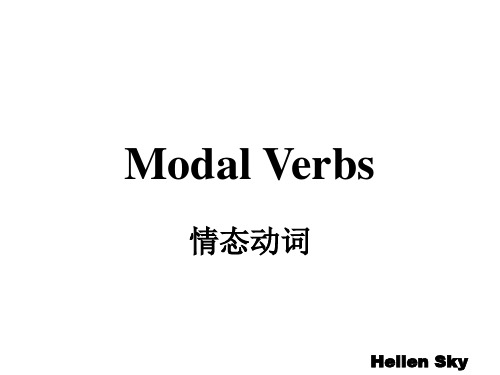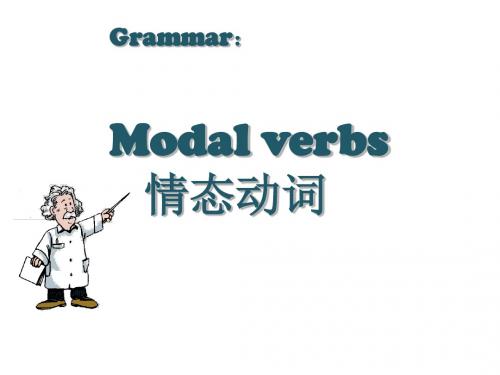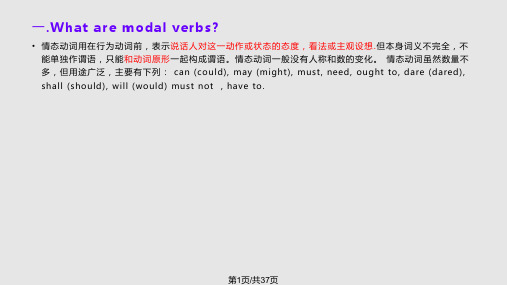高一英语情态动词PPT优秀课件
合集下载
人教版高一英语必修三 unit1 grammar 情态动词课件

e.g: He must/can/may/might know the answer to the question.
表推测的 三种句式
2. 否定句:can't/couldn't (不可能),may not/might not (可能不)
e.g: It can't/ couldn't be the Miss Lin. She has gone to America.
The boy can’t be Jim. He’s can可能 much taller.
can’t不可能 这个男孩不可能是吉姆。他 要高很多。
2. 常见情态动词
原形
用法
含义
例句
(过去式)
may
(might)
Tony may know the way.
表示可能性(可 与maybe互换)
可能
=Maybe Tony knows the way.
2. 常见情态动词
原形
用法
(过去式)
表示能力(= be able to)
含义
例句
能;会
Tom can swim. =Tom is able to swim.
汤姆会游泳。
can
(could)
(疑问句中)表示 请求
可以 Could you give us a hand?
你可以帮我们一下吗?
(否定句、疑问 句中)表示可能 性
• can 不肯, may 不问,must 不否问
注释: can表示推测通常不用于肯定句 may表示推测通常不用于疑问句 must表示推测通常不用于否定句和疑问句
肯定猜测的语气强弱:must>can> could>may>might
情态动词专题知识公开课获奖课件

第7页
②在予以他人许可时,常用can,但有时也用may。不能用 might。
-May I play basketball this afternoon? 今天下午我可以打篮球吗? -Yes,you may. 行,可以。
第8页
(2)表达也许性 may和might表达也许性时,可以对目前、过去或未来进行 推测。 Peter may e with us tonight,but he isn't sure yet. 彼得今晚也许和我们一起来,但他还没确定。 He might be studying in the classroom. 他也许正在教室里学习。
用于必定句,表示对
taken the other road.It might have
过去没有做某事遗憾,意思 been quicker.可能我们本应走另一
should/ou 为“原来能够……(但实际 条路,那样可能更加快些。
第17页
(3)用于法律、公约、约定等正式条文,重要用于第三人称。 Students shall remain in their seats until all the papers have been collected. 试卷所有收回后学生方可离开座位。
第18页
5. will和would使用措施 作情态动词will,would与作助动词will,would多种形式相 似。 (1)表达自愿做或积极提出做什么,如意志、愿望或决心等。 would用于过去状况。
第14页
The TV set is broken. I have to buy a new one. 电视机坏了。我不得不再买台新。 The students will have to know how to use the puters. 学生将必须理解怎样使用电脑。 He had to go,because his mother was ill. 他不得不离开,由于他母亲病了。
②在予以他人许可时,常用can,但有时也用may。不能用 might。
-May I play basketball this afternoon? 今天下午我可以打篮球吗? -Yes,you may. 行,可以。
第8页
(2)表达也许性 may和might表达也许性时,可以对目前、过去或未来进行 推测。 Peter may e with us tonight,but he isn't sure yet. 彼得今晚也许和我们一起来,但他还没确定。 He might be studying in the classroom. 他也许正在教室里学习。
用于必定句,表示对
taken the other road.It might have
过去没有做某事遗憾,意思 been quicker.可能我们本应走另一
should/ou 为“原来能够……(但实际 条路,那样可能更加快些。
第17页
(3)用于法律、公约、约定等正式条文,重要用于第三人称。 Students shall remain in their seats until all the papers have been collected. 试卷所有收回后学生方可离开座位。
第18页
5. will和would使用措施 作情态动词will,would与作助动词will,would多种形式相 似。 (1)表达自愿做或积极提出做什么,如意志、愿望或决心等。 would用于过去状况。
第14页
The TV set is broken. I have to buy a new one. 电视机坏了。我不得不再买台新。 The students will have to know how to use the puters. 学生将必须理解怎样使用电脑。 He had to go,because his mother was ill. 他不得不离开,由于他母亲病了。
高中英语情态动词课件精品

couldn’t be a doctor.
B. could可以代替can表示请求、“允许
”。可表示委婉客气的提出问题或陈述
看法
Could you lend me your dictionary? Could I use your bike? Yes, you can. I’m afraid I couldn’t give you an answer today.
意愿“要;愿”
Would 与 Used to do 区别 ——— “过去常常”
Would
------过去习惯的动作(现在有可能还有此习惯)
Used to do
--------过去习惯的动作及状态(现在已经没有此习惯)
e.g. He would get up at 8 a.m. (现在有可能还在坚持此习惯) e.g. He used to get up at 8 a.m. (现在已经不再坚持此习惯)
动作
e.g. There used to be an old building
here when I was young.
状态
shall和should:
1. shall用于构成将来时是助动词。 shall用于征求对方的意见,表示 “决心” 是情态动词。 eg: Perhaps I shall pay a visit to England this winter. 可能今年冬天我会去英国观光。 (构成一般将来时, 助动词)
3)表示请求或允许(和may意思相近)常见于 口语。 Can (May) I come in ? 我能进来吗? Can I smoke here ? 我可以在这里抽烟吗?
2) could的主要用法是: A. could 是can的过去式, 表示与过去 有关的能力和推测:
B. could可以代替can表示请求、“允许
”。可表示委婉客气的提出问题或陈述
看法
Could you lend me your dictionary? Could I use your bike? Yes, you can. I’m afraid I couldn’t give you an answer today.
意愿“要;愿”
Would 与 Used to do 区别 ——— “过去常常”
Would
------过去习惯的动作(现在有可能还有此习惯)
Used to do
--------过去习惯的动作及状态(现在已经没有此习惯)
e.g. He would get up at 8 a.m. (现在有可能还在坚持此习惯) e.g. He used to get up at 8 a.m. (现在已经不再坚持此习惯)
动作
e.g. There used to be an old building
here when I was young.
状态
shall和should:
1. shall用于构成将来时是助动词。 shall用于征求对方的意见,表示 “决心” 是情态动词。 eg: Perhaps I shall pay a visit to England this winter. 可能今年冬天我会去英国观光。 (构成一般将来时, 助动词)
3)表示请求或允许(和may意思相近)常见于 口语。 Can (May) I come in ? 我能进来吗? Can I smoke here ? 我可以在这里抽烟吗?
2) could的主要用法是: A. could 是can的过去式, 表示与过去 有关的能力和推测:
情态动词语法讲解PPT课件

2表示“许可”和“不许”
a)请求对方“许可”可用can, could, may, might.
may/might较正式,could/might较委婉
表示给予“许可”通常用can/may,而不用 could/might
Could I use your phone? Yes, of course you can. Might I trouble you for a light? You may indeed.
表示将来的“必须”,常用have to的一定 形式(will/shall have to) 比较:
•We must do it again.(表示现在)
•We’ll have to do it again.(表示将来)
•表示过去的“必须”,常用had to
•I had to leave at six yesterday.
•They must be home by now.(他们现在一定到家了)
will/would表示“推测”可有三种情况
1)对特定事态的推测
A: Who’s that man over there? B: That will be George, no doubt. C: That would be George, I except.
• Can they have missed the bus?
• Yes, they may have.
may not重音落在助动词上,表示 “不可能”,重音落在否定词上,表 示“不许可” , 比较:
•He may not go tomorrow.
•He may not go tomorrow.
•所以在书面语中,表示“不可能” 常用can’t
我的公开课情态动词课件

2. —What’s the name of the book? —Khulaifi. _________ I spell it for you? A. Shall B. Would C. Can D. Might
情态动词表必要性
• must • need
高考真题演练
must 表“必须”
mustn’t 禁止
A. might B. must C. would D. can
3. What do you mean, there are only ten tickets? There ______ be twelve.
A. should B. would C. will D. shall
4. It is usually warm in my hometown in March, but it _____ be rather cold sometimes.
1. 不必须
don’t have to needn’t do
don’t need to
2. must还可表示“偏偏、偏要” e.g. Must you make so much noise?
• You ___ buy a gift, but you can if you want to.
• must
1. 常用于否定句或疑问句。 e.g. You can’t be hungry already — you had
lunch only two hours ago!
2. can用于肯定句中表示理论上的可能性,并不 牵涉是否真的会发生
e.g. You can hurt yourself if you play in the street.
A. must B. can C. should D. would
人教版高一英语Book 3 Unit 1 语法:情态动词 Grammar Modal Verbs课件[内嵌音频](共23张PPT)
](https://img.taocdn.com/s3/m/b56df0754b73f242336c5f6b.png)
could have done
本来能够做却没做
should/ought to have done
本来应该做却没做
shouldn’t/oughtn’t to have done
本来不该做却做了
needn’t have done
本来不必做却做了
DESIGNED BY Mr.Fan
1. ---Guess what! I have got A for my term paper.
A. can’t
B. wouldn’t
C. shouldn’t
D. needn’t
4. She ______ have left school, for her bike is still here.
A. can’t
B. wouldn’t
C. shouldn’t
D. needn’t
DESIGNED BY Mr.Fan
5. He ___B_______ have completed his work;
otherwise, he wouldn’t be enjoying himself by the seaside. A. should B. must C. wouldn’t D. can’t
3. 表请求或许可(表请求时,could比can语气更委婉)
Can/Could I use your dictionary?
Could you lend me a hand?
DESIGNED BY Mr.Fan
1. Michael ____B___ be a policeman, for he’s much
对现在的推测
must have done
must do
本来能够做却没做
should/ought to have done
本来应该做却没做
shouldn’t/oughtn’t to have done
本来不该做却做了
needn’t have done
本来不必做却做了
DESIGNED BY Mr.Fan
1. ---Guess what! I have got A for my term paper.
A. can’t
B. wouldn’t
C. shouldn’t
D. needn’t
4. She ______ have left school, for her bike is still here.
A. can’t
B. wouldn’t
C. shouldn’t
D. needn’t
DESIGNED BY Mr.Fan
5. He ___B_______ have completed his work;
otherwise, he wouldn’t be enjoying himself by the seaside. A. should B. must C. wouldn’t D. can’t
3. 表请求或许可(表请求时,could比can语气更委婉)
Can/Could I use your dictionary?
Could you lend me a hand?
DESIGNED BY Mr.Fan
1. Michael ____B___ be a policeman, for he’s much
对现在的推测
must have done
must do
优秀教学课件推选情态动词

A. needn’t do B. needn’t have done C. mustn’t do D. shouldn’t have done
6. My MP4 isn’t in my bag. Where_____I have put it? A. can B. must C. should D. would
tree
when
I
was
a
child.
3. I will be able to swim next week.
3. be able to 表能力,可用于多种时态
4. The fire spread through the hotel very quickly but
4. beevearybolnee wtoas强ab调le 成to g功et地ou做t. 了某事
hates traveling.
3. may/ might as well “不妨” e.g. You may as well stay for dinner.
1. T am sure that he
doesn’t wear glasses.
A. can’t
hours ago!
2. can用于肯定句中表示理论上的可能性,并不牵涉是 否真的会发生
e.g. You can hurt yourself if you play in the street.
may/ might表示推测
1. can not 不可能 may not 可能不
2. may well “极有可能” e.g. Liza may well not want to go on the trip --- she
谢谢观看
请指导
3. What do you mean, there are only ten tickets? There ______ be twelve.
6. My MP4 isn’t in my bag. Where_____I have put it? A. can B. must C. should D. would
tree
when
I
was
a
child.
3. I will be able to swim next week.
3. be able to 表能力,可用于多种时态
4. The fire spread through the hotel very quickly but
4. beevearybolnee wtoas强ab调le 成to g功et地ou做t. 了某事
hates traveling.
3. may/ might as well “不妨” e.g. You may as well stay for dinner.
1. T am sure that he
doesn’t wear glasses.
A. can’t
hours ago!
2. can用于肯定句中表示理论上的可能性,并不牵涉是 否真的会发生
e.g. You can hurt yourself if you play in the street.
may/ might表示推测
1. can not 不可能 may not 可能不
2. may well “极有可能” e.g. Liza may well not want to go on the trip --- she
谢谢观看
请指导
3. What do you mean, there are only ten tickets? There ______ be twelve.
《英语情态动词》PPT课件

(12) You can't be too careful while driving. 开车时越小心越好。
【结论6】 cannot ... too/enough表示“无论……也不过 分”;“越……越好”。用来加强语气。 (13) I couldn't but choose to wait.
【结论7】cannot but do sth. 不得不;只好 (14) They were able to put out the fire without any help from the firefighters.
(8) Can it be true? (9) You can't be serious! (10) Oh, dear, what on earth can this mean? (11) How could you do such a silly thing? 你怎么能做那样的蠢事呢? 【结论5】表示惊讶、怀疑、不相信的态度,常用在否 定句、疑问句和感叹句中。
(3)表示“偏执”,“固执” “偏要、硬要” 。 — How old are you, madam? — If you must know, I'm twice my son's age. Don't interrupt me, John. Must you force me to tell you the truth at the moment?
A computer can’t think for itself; it must be told what to do.(一般能力) 句意为:对绝大多数受到威胁时而不能起身逃跑的植物 He is a native speaker of English, so he can of course 来说,最大的问题是动物喜欢吃它们。情态动词can 可 speak English quite well.(一般能力) 表示对能力的否定。 I以表示人的能力和物的性能,故选 am starving to death. I can eat twoB bowls of rice now. (现在的能力) The biggest problem for most plants, which ___just get up and run away when threatened, is that animals like to eat them.(07湖南) A. shan’t B. B can’t C. needn’t D. mustn’t
情态动词精品课件PPT课件

第22页/共52页
• It is usually warm in my hometown in March,but it can be rather cold sometimes.
• 我的家乡在三月份通常很暖和,但有时候也会相当冷。 • Mr.Bush is on time for ever ything.How can it be that he was late for the
meeting? • 布什先生做什么事情都很准时,他怎么可能开会迟到呢? • He can't be in the classroom ,for the light has been turned off. • 他一定不在教室里,因为灯已关了。
第23页/共52页
• 2.may用于肯定句中可以用来表示推测,意为“可能”;用于否定句中也可以表示 推测,may not意为“可能不”,表示一种不太确定的语气。may在疑问句中一般不 表示推测。
You'd better not. 等)不,你不可以用。
第11页/共52页
• 3.must和have to的用法 • must表示“必须、应该”。否定形式must not(mustn't)表示“不应该、不许可、
不准、禁止”等。在回答must的问句时,否定式常用need not(needn't)或don't have to表示“不必”,而不用must not,因为must not表示“禁止”。must表 示“一定、必定”等推测意义时,一般只用在肯定句中。 • The work must be finished as soon as possible. • 这项工作必须尽快完工。
第21页/共52页
• 热点考向二 情态动词表“推测”的用法 • 表示对目前或将来情况的推测往往用“情态动词+动词原形”这种结构。 • 1.can用于肯定句中表示可能性,意为“有时会”;用于疑问句中可以表示推测,意
• It is usually warm in my hometown in March,but it can be rather cold sometimes.
• 我的家乡在三月份通常很暖和,但有时候也会相当冷。 • Mr.Bush is on time for ever ything.How can it be that he was late for the
meeting? • 布什先生做什么事情都很准时,他怎么可能开会迟到呢? • He can't be in the classroom ,for the light has been turned off. • 他一定不在教室里,因为灯已关了。
第23页/共52页
• 2.may用于肯定句中可以用来表示推测,意为“可能”;用于否定句中也可以表示 推测,may not意为“可能不”,表示一种不太确定的语气。may在疑问句中一般不 表示推测。
You'd better not. 等)不,你不可以用。
第11页/共52页
• 3.must和have to的用法 • must表示“必须、应该”。否定形式must not(mustn't)表示“不应该、不许可、
不准、禁止”等。在回答must的问句时,否定式常用need not(needn't)或don't have to表示“不必”,而不用must not,因为must not表示“禁止”。must表 示“一定、必定”等推测意义时,一般只用在肯定句中。 • The work must be finished as soon as possible. • 这项工作必须尽快完工。
第21页/共52页
• 热点考向二 情态动词表“推测”的用法 • 表示对目前或将来情况的推测往往用“情态动词+动词原形”这种结构。 • 1.can用于肯定句中表示可能性,意为“有时会”;用于疑问句中可以表示推测,意
高中英语情态动词各种用法课件(共47张PPT)

一 、表能力 :表现在的或一般的能力:表示 现在的或一般的能力用can 或 be able to. 一 般的能力是指你无论什么时候做什么事情就 能做到的能力。表示现在的能力或一般的能 力时,can比be able to 更普遍。
A computer can’t think for itself; it must be told what to do. (表示一般的能力)
This can’t / couldn’t be done by him. (表示不 相信)
He could be on his way home now. (could 不 如 may / might常用)
Can this be done by him? (表示一种疑惑、 惊讶)
(3)would, could, should, might 并不一定 与过去的时间有关,而是表示可能性弱于他 们相应的现在形式。如:
do something / succeeded in doing sth.
The fire spread through the hotel very
quickly but everyone was able to get out. (过去有能力并成功地做了某事)
(3) could have + 过去分词,表示过去有 能力做但未做。
表示对过去已经发生的行为进行推测,意为 “想必 / 准是/ 一定做了某事
It must have rained last night, for the road was quite muddy.
The lights were out. They must have been asleep.
2. can have done
高中英语情态动词PPT课件

第11页/共37页
very uncertain
almost certain
might may could (can) should ought to will must
1.He _____ be at home.
A.may B.might C.must
2.He _____ be at home, for he just called me from his home 15 seconds ago.
Would rather…
第20页/共37页
will/would:
2.表示意志、愿望和决心。 有愿意,要的意思,will指 现在,would指过去的习惯 性动作或倾向。
I will never do that again.
I would go there with you.
第21页/共37页
will/would:
can表示与生俱来的能力或一种客观可能,而 be able to更加强调通过后天的学习和努力获 得的能力,或者在某个客观的场合和背景下, 能做到的事情。
第8页/共37页
advisability
necessity
ought to/should
have to
must
Your mother brings you up and takes good care of you, so when she is old, you ___ look after her in return.
第15页/共37页
4.Permission(允许) may/might:
1. 表示许可,常译为可以。表示请 求、允许时,might比may的语气 -更Mi委gh婉t/一M些ay。I use your computer? - Yes, you can. /No, you can’t/mustn’t.
very uncertain
almost certain
might may could (can) should ought to will must
1.He _____ be at home.
A.may B.might C.must
2.He _____ be at home, for he just called me from his home 15 seconds ago.
Would rather…
第20页/共37页
will/would:
2.表示意志、愿望和决心。 有愿意,要的意思,will指 现在,would指过去的习惯 性动作或倾向。
I will never do that again.
I would go there with you.
第21页/共37页
will/would:
can表示与生俱来的能力或一种客观可能,而 be able to更加强调通过后天的学习和努力获 得的能力,或者在某个客观的场合和背景下, 能做到的事情。
第8页/共37页
advisability
necessity
ought to/should
have to
must
Your mother brings you up and takes good care of you, so when she is old, you ___ look after her in return.
第15页/共37页
4.Permission(允许) may/might:
1. 表示许可,常译为可以。表示请 求、允许时,might比may的语气 -更Mi委gh婉t/一M些ay。I use your computer? - Yes, you can. /No, you can’t/mustn’t.
专题六情态动词和虚拟语气ppt(共45张PPT)

We may as well stay where we are.
三、虚拟语气在定语从句中的运用
他大可为他的儿子感到自豪。
—Are you
coming to Jeff’s party?
must have been
Heraappearance
has changed
sotomuch
you may well not recognize
—Don
come.He said he wasn’t certain what his plans
were.
A.must not
(
B.need not
C.would not
)④Jack described his father,who
D.might not
a brave boy many years ago,as a
( )⑩The new regulation
C
take effect on June 1st.
考点知识全面总结 栏目索引
注意:shall与第二、三人称连用用于陈述句,表示说话者的命令、警告
或威胁;当宣布法律规定时,shall也有此用法。
You shall leave the room at once,and he also shall.(=I order you and him to
力、必要性的用法;在虚拟语气方面,要结合句意弄清楚虚拟条件句中
是对什么时间的虚拟,对于其他从句中的虚拟语气,要区分哪些与时间
有关,哪些只有一种形式。
考点知识全面总结 栏目索引
考点知识全面总结
考点知识全面总结 栏目索引
考点知识全面总结 栏目索引
考点知识全面总结 栏目索引
三、虚拟语气在定语从句中的运用
他大可为他的儿子感到自豪。
—Are you
coming to Jeff’s party?
must have been
Heraappearance
has changed
sotomuch
you may well not recognize
—Don
come.He said he wasn’t certain what his plans
were.
A.must not
(
B.need not
C.would not
)④Jack described his father,who
D.might not
a brave boy many years ago,as a
( )⑩The new regulation
C
take effect on June 1st.
考点知识全面总结 栏目索引
注意:shall与第二、三人称连用用于陈述句,表示说话者的命令、警告
或威胁;当宣布法律规定时,shall也有此用法。
You shall leave the room at once,and he also shall.(=I order you and him to
力、必要性的用法;在虚拟语气方面,要结合句意弄清楚虚拟条件句中
是对什么时间的虚拟,对于其他从句中的虚拟语气,要区分哪些与时间
有关,哪些只有一种形式。
考点知识全面总结 栏目索引
考点知识全面总结
考点知识全面总结 栏目索引
考点知识全面总结 栏目索引
考点知识全面总结 栏目索引
高中英语语法情态动词(28张PPT)-经典通用课件资料

2021/10/10
19
4. Tom ought not to ___ me your secret,
but he meant no harm.
A. have told
B. tell
C. be telling
D. having told
答案A 由于后句为过去时,告诉秘密的动作又发生在其前因,此地应用过去完成时,但它在情态动词 ought to 后,所以用have。
Must I go there in person? 我必须亲自去吗? We must always follow the Party.我们要永远跟着党走。 ②表示“必然”
All men must die.人总是要死的。 ③表示推测,“准是”、“一定”,否定形式为can’t
She must be at home now.她现在准在家。
- May I come in? -Might I go to the hospital to see my father? ②否定形式为may not, 但表示“不可以”或“禁止”时用must not (mustn’t). e.g.-May I watch TV now?我现在可以看电视吗? -No, you mustn’t. 不,你不可以看。 ③ may, might还可以表示推测,但might可能性比may 小。 e.g. There may be a few copies left in the bookstore. 书店里可能还有几本书。 They might have been killed by radiation. ④may 放在句首, 表示祝愿。 e.g. May God bless you!
e.g. You don’t have to tell him about it. 你没必要把此事告诉他。
Unit 5 情态动词和过去将来时(课件)-高中英语人教版(2019)必修第三册

I don't wraenqtutoelsivt,e awditvhoicutey, oeutc. But nothing's gonna change my love for
you
A. necessity B. possibility C. obligation
Leading-in Read the seDn.terenqcueesstbeloEw. aadnvdictehink abFo. iuntt:ention
you You _o_u_g_h_t__to_ know by now how much
wHhoeldremweTenhwoewayntatoregocalled
modal
I love you
vTeherbwso.rlTd h_m_ea_yy_
achraenguesmedy
wtohole
life
Touch meexnporwess ability, obligatitohnro,upghossibility, intension,
ought to和should都表示“应该”,一般情况下可互 换 使 用 , 但 ought to 语 气 略 强 , 属 正 式 用 语 , 而 should较常用。
4.must表示非得、偏偏。
Why must you always interrupt me?
shall & should & ought to 合作探究
shall
• 1.shall用于第一、三人称疑问句中,表示说话人征求对方的意见和向对
方请示,“…好吗?要不要…?”
• Shall I open the window for you? • Shall he fetch some water for you? • 2.shall用于第二、三人称陈述句中,表示说话人给对方的许诺、命令、
- 1、下载文档前请自行甄别文档内容的完整性,平台不提供额外的编辑、内容补充、找答案等附加服务。
- 2、"仅部分预览"的文档,不可在线预览部分如存在完整性等问题,可反馈申请退款(可完整预览的文档不适用该条件!)。
- 3、如文档侵犯您的权益,请联系客服反馈,我们会尽快为您处理(人工客服工作时间:9:00-18:30)。
A.will B. should C. can D. need
10. Joan_____ come with us this afternoon, but she isn’t very sure yet. A. can B. may C. must D. will
11. I _____ ask you the question because I think I _____ be wrong.
D. can
13. The fire spread through the
building very quickly but everyone
____ get out.
A. had to
B. would
C. could
DD. was able to
14.---What do you think of this answer?
20. ---I came here by taxi and the driver charged me 50 yuan. ---Really? You _____ have come by bus.
B. needn’t
C. may not D. mustn’t
16. He doesn’t have to work tomorrow,
but you have got to, ____ you?
A.don’t
B. haven’t
C. haven’t got D. can’t
17. You_____ wake me up when I fall asleep, ______ you? A. haven’t better; have B. would not rather; would C. had better not; should D. had not better; must
情态动词专项练习
1.–May I sit beside you, sir?
--- No, you ______. My girlfriend is
coming soon.
A.can’t
B. mustn’t
C. needn’t
D. shouldn’t
2.-- _____ I speak to Mary, please?
A. mustn’t; can B. can’t; has to C. daren’t; should DD. needn’t; may
7. --- __ I tell Mary the test results? --- No, you____. She’s already got
the score. A. Will; won’t BB. Shall; needn’t C. May; mustn’t D. Can; don’t
---I don’t think it ____ be right.
A.should
B. might
C. must
D. can
15. --- Is John coming by train?
--- He should, but he ___. He likes
driving his car.
A. can’t
A.daren’t; must B. mustn’t; can C. needn’t; may D. can’t; should
12. It’s nearly eight o’clock. Mike
_____ be here at any moment.
A. need
B. has to
C. should
19. --- We didn’t see him at the lecture.
--- Neither did anybody else. He _____ it. A. may not have attended B. mustn’t attend C. can’t have attended D. couldn’t attend
A.can; needn’t B. must; can’t C. shall; won’t D. may; mustn’t
4. My wife never remembers my
telephone number. She always ____
look it up.
A. she____ come to the phone
because she isn’t in.
A. Might; won’t B. Can’t; mustn’t
C. May; can’t D. Couldn’t; shouldn’t
3. --- I want to know if I _ smoke here. --- No, you____ . Could you see the sign “NO SMOKING” there?
C. would
D. has to
5. --- ____ you pass me the English magazine, please? --- Sure. Here you are.
A.Could B. Need C. Must D. Might
6. ---Must I go to work with you? --- No, you_____. Linda ______ go with me.
8. You ____ be careful when crossing
here. The traffic lights aren’t working.
A. might
B. ought to
C. could
D. may
9. ---Could I borrow your bicycle? --- Yes, of course you_____.
18. ---Why! I couldn’t get you on the phone this morning. --- We _____ tennis in the yard when you phone me.
A.could be playing B. must be playing C. must have been playing D. should have played
10. Joan_____ come with us this afternoon, but she isn’t very sure yet. A. can B. may C. must D. will
11. I _____ ask you the question because I think I _____ be wrong.
D. can
13. The fire spread through the
building very quickly but everyone
____ get out.
A. had to
B. would
C. could
DD. was able to
14.---What do you think of this answer?
20. ---I came here by taxi and the driver charged me 50 yuan. ---Really? You _____ have come by bus.
B. needn’t
C. may not D. mustn’t
16. He doesn’t have to work tomorrow,
but you have got to, ____ you?
A.don’t
B. haven’t
C. haven’t got D. can’t
17. You_____ wake me up when I fall asleep, ______ you? A. haven’t better; have B. would not rather; would C. had better not; should D. had not better; must
情态动词专项练习
1.–May I sit beside you, sir?
--- No, you ______. My girlfriend is
coming soon.
A.can’t
B. mustn’t
C. needn’t
D. shouldn’t
2.-- _____ I speak to Mary, please?
A. mustn’t; can B. can’t; has to C. daren’t; should DD. needn’t; may
7. --- __ I tell Mary the test results? --- No, you____. She’s already got
the score. A. Will; won’t BB. Shall; needn’t C. May; mustn’t D. Can; don’t
---I don’t think it ____ be right.
A.should
B. might
C. must
D. can
15. --- Is John coming by train?
--- He should, but he ___. He likes
driving his car.
A. can’t
A.daren’t; must B. mustn’t; can C. needn’t; may D. can’t; should
12. It’s nearly eight o’clock. Mike
_____ be here at any moment.
A. need
B. has to
C. should
19. --- We didn’t see him at the lecture.
--- Neither did anybody else. He _____ it. A. may not have attended B. mustn’t attend C. can’t have attended D. couldn’t attend
A.can; needn’t B. must; can’t C. shall; won’t D. may; mustn’t
4. My wife never remembers my
telephone number. She always ____
look it up.
A. she____ come to the phone
because she isn’t in.
A. Might; won’t B. Can’t; mustn’t
C. May; can’t D. Couldn’t; shouldn’t
3. --- I want to know if I _ smoke here. --- No, you____ . Could you see the sign “NO SMOKING” there?
C. would
D. has to
5. --- ____ you pass me the English magazine, please? --- Sure. Here you are.
A.Could B. Need C. Must D. Might
6. ---Must I go to work with you? --- No, you_____. Linda ______ go with me.
8. You ____ be careful when crossing
here. The traffic lights aren’t working.
A. might
B. ought to
C. could
D. may
9. ---Could I borrow your bicycle? --- Yes, of course you_____.
18. ---Why! I couldn’t get you on the phone this morning. --- We _____ tennis in the yard when you phone me.
A.could be playing B. must be playing C. must have been playing D. should have played
